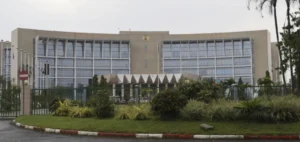Sixteen crew members of a tanker have been brought to trial in Nigeria by a court in Port Harcourt, the oil capital of the south-east of the country, accused in particular of oil trafficking.
Nigeria loses hundreds of thousands of barrels a day to theft offshore or siphoning from pipelines for resale on the black market, and the country, one of Africa’s top oil producers, is trying to crack down on the theft, which is generating billions of dollars in lost revenue.
On August 8, the Nigerian navy attempted to intercept the supertanker Heroic Idum suspected of being involved in illegal trafficking off Port Harcourt, before it fled under the pretext of a pirate attack, according to the Nigerian navy, and was arrested off Equatorial Guinea.
Last week, Malabo authorized the handover of the supertanker and its crew, made up of Indian, Sri Lankan and Filipino nationals, to the Nigerian authorities.
At the hearing on Monday in Port Harcourt, the crew pleaded not guilty.
Speaking to journalists after the hearing, the captain of the supertanker Tanuj Mehta defended himself by assuring them that he had followed the instructions of his superiors and referring to a misunderstanding: “We arrived in Nigeria on 8 August (…) During the night, we had an incident with a boat which we did not know belonged to the Nigerian navy.
According to authorities, oil production has fallen to an all-time low, below one million barrels per day, in part due to unprecedented thefts from pipelines and oil fields in the Niger Delta region.






















